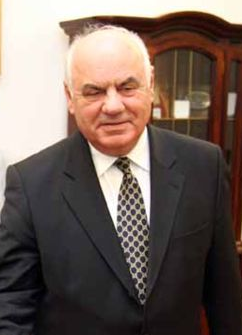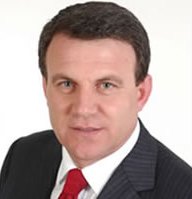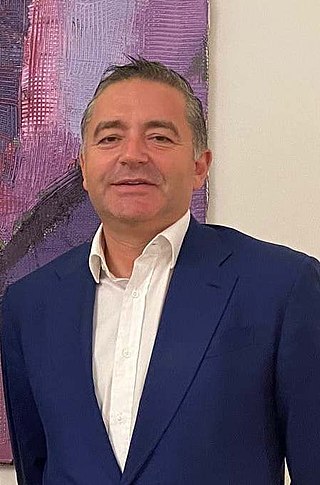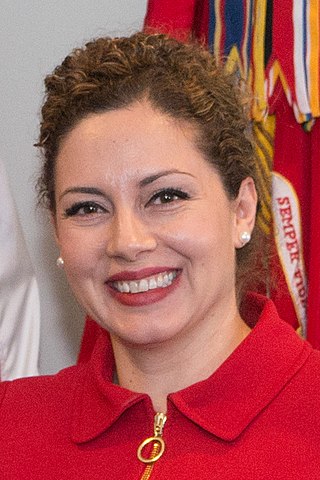
Alfred Spiro Moisiu is a former Albanian military general, diplomat and politician. He was the president of Albania from 2002 to 2007. He is the oldest son of Albanian Army general Spiro Moisiu.

The prime minister of Albania, officially the prime minister of the Republic of Albania, is the head of government of Albania. The office of the prime minister is a core institution in the politics of Albania formed after the Albanian declaration of independence on 28 November 1912. Since that time, the nation has navigated a dynamic political evolution spanning distinct periods, encompassing a monarchy, a communist regime and the eventual democratic order. In 1912, Ismail Qemali was inaugurated as the first prime minister of Albania, guiding the nation toward sovereignty amidst the complex conditions in the Balkans. In 1944, Enver Hoxha implemented a radical change in government, transforming Albania into an authoritarian and isolationist communist regime. In 1991, the nation transitioned into a democracy that marked a notable shift, when Fatos Nano emerged as the first post-communist prime minister of Albania.

Pandeli Sotir Majko is an Albanian socialist politician. He served twice as Prime Minister of Albania; once from 1998 to 1999, and again in 2002.

Ilir Rexhep Meta is an Albanian politician. He served as the president of Albania from 24 July 2017 to 24 July 2022.

The South-East European Cooperation Process (SEECP) was launched on Bulgaria's initiative in 1996. At the Bulgaria-chaired meeting in Sofia, the Southeast Europe (SEE) countries laid the foundations for regional co-operation for the purposes of creating an atmosphere of trust, good neighbourly relations and stability.
In 1991, the Socialist Party of Albania, with specific social democratic ideology took control of the country through democratic elections. One year later the Democratic Party of Albania won the new elections. After 1990, Albania has been seeking a closer relationship with the West. What followed were deliberate programs of economic and democratic reform, but the implementation of capitalism led to the proliferation of pyramid schemes. Chaos in late 1996 to early 1997, as a result of the collapse of these pyramid schemes, alarmed the world and prompted the influx of international peacekeeping forces. In 1995, Albania was accepted into the Council of Europe and requested membership in NATO and is a potential candidate country for accession to the European Union. The workforce of Albania has continued to emigrate to Western countries, especially Greece and Italy.

The Ministry for Europe and Foreign Affairs is a department of the Albanian Government, in charge of diplomacy, foreign policy and the process of admission of Albania into the European Union. The ministry also provides support to Albanian citizens residing abroad. In September 2017, the ministry was restructured and it was merged with the Ministry of European Integration.

Arben Malaj has been Minister of Finance and Economy in the Republic of Albania different times from 1997 until 2005. He is known for transforming the Albanian economy into a European profile, after the hard social-economic crisis that this country passed during the year 1997. He served as a Member of the Albanian Parliament from 1997 to 2013 chairing the Parliamentary Committee on Economy and Finance.

The Ministry of Economy, Culture and Innovation is a department of the Albanian Government responsible for the implementation of economic, cultural affairs and innovation. Blendi Gonxhja is the minister serving since January 2024.

The Ministry of Justice is a department of the Albanian Government, responsible for the implementation of government justice policy, the Albanian legal system in the Constitution and general administrative law, civil law, procedural law and criminal law as well as matters relating to democratic issues, human rights, integration and minority issues and metropolitan affairs.

The Ministry of Education and Sports is a department of the Albanian Government responsible for Education and Sport. The current minister is Evis Kushi.

Blendi Klosi is an Albanian Socialist Party politician and the Member of Parliament (MP) for Berat. On 13 September 2017, Mr. Klosi was appointed as Minister of Tourism and Environment by the 2nd Rama government.

Tornike Gordadze is a former Georgian minister and French political scientist. He was Georgia's State Minister for Euro-Atlantic Integration from August 24, 2012 to October 25, 2012.

The Ministry of Economy was a department of the Albanian government responsible for the Economy, Tourism and Enterprise in Albania.

The Ministry of Transport was a department of the Albanian Government responsible for the transport, infrastructure, technical standards, water supply and sanitation, and urban waste management.

The Ministry of Internal Affairs is a department of the Albanian Government, in charge of regulation for the protection of rights and liberties of Albanian citizens. Collaborating with the State Police, the ministry investigates unlawful acts against the interest of society and state, fights crime, provides civil order, ensures civil security, traffic safety, and protects the security and protection of important individuals.

The Ministry of Labour and Social Affairs was a ministry of the Albanian Government charged with the responsibility to protect and safeguard the interest of workers in general and the poor, deprived and disadvantaged sections of the society. The Ministry was dissolved on 13 September 2017 and its departments were merged with other ministries. Most of its functions are now performed by the Ministry of Health and Social Protection.

Olta Xhaçka is an Albanian politician and Socialist Party member of Parliament. She served as the minister of Europe and foreign affairs from January 2021 to September 2023. She served as Albanian minister of social welfare and youth between March 2017 to August 2017 and as minister of defense from September 2017 to December 2020.

The second Government of Prime Minister Edi Rama was the 66th ruling Government of the Republic of Albania which was officially mandated by the President on 13 September 2017. Following the 2017 election, the Socialist Party won a majority of seats to Parliament and had the right to form the government without the need of a coalition.
The Ministry of Industry and Mines was a department of the Government of Albania responsible for the proposal and execution of government policies on the country's industry and the promotion and defence of industrial property.



















